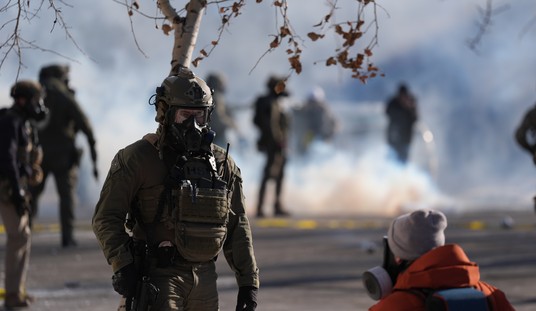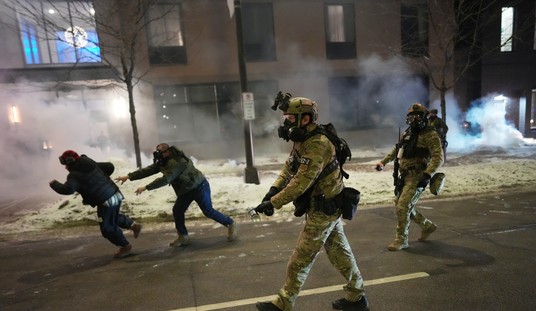How will the former upper echelons of the FBI answer for themselves in the wake of the withdrawal of charges against Michael Flynn? If former FBI deputy director Andrew McCabe gives us any indication, it will be a full-frontal defense and an attack on the present leadership of the Department of Justice. “General Flynn was not targeted,” McCabe told CNN’s John Berman, “he was properly investigated in a well predicated case.”
A brief part of the conversation is below, but McCabe goes on to say that the reason the FBI conducted a veiled interrogation of Flynn was that he had “surreptitious” meetings with Russian ambassador Sergei Kislyak while on Donald Trump’s transition team. That claim is “bizarre,” CBS News legal analyst Jonathan Turley wrote, as was practically the entirety of McCabe’s rebuttal:
The claim that this was "surreptitious" is bizarre. Flynn told the transition team about the call. It is not "surreptitious" because McCabe did not know about it and did not ask Trump official about a legal call with the Russians by the incoming National Security Adviser.
— Jonathan Turley (@JonathanTurley) May 8, 2020
Turley expanded on his thoughts later this morning at his blog. Not only did McCabe completely mischaracterize Flynn’s actions in claiming that as a predicate, the rest of his interview with Berman was “revisionist history that quickly crossed into fantasy”:
On January 4, 2017, the FBI’s Washington Field Office issued a “Closing Communication” indicating that the bureau was terminating “CROSSFIRE RAZOR” — the newly disclosed codename for the investigation of Flynn. CROSSFIRE RAZOR was formed to determine whether Flynn “was directed and controlled by” or “coordinated activities with the Russian Federation in a manner which is a threat to the national security” of the United States or a violation of federal foreign agent laws. The FBI investigated Flynn and various databases and determined that “no derogatory information was identified in FBI holdings.” Due to this conclusion, the Washington Field Office concluded that Flynn “was no longer a viable candidate as part of the larger CROSSFIRE HURRICANE umbrella case.”
After Strzok intervened to stop the closure of the investigation, he texted FBI lawyer Lisa Page “Razor still open. :@ but serendipitously good, I guess. You want those chips and Oreos?” Page replied “Phew. But yeah that’s amazing that he is still open. Good, I guess.” Strzok replied “Yeah, our utter incompetence actually helps us. 20% of the time, I’m guessing :)”
So McCabe was left unchallenged in saying that at that time there was a close question as to whether to close Crossfire Razor when his investigators found nothing. Nothing. That made it a close question for McCabe whether to continue to investigate the incoming Trump National Security Adviser.
William Barr raised this same point in his interview with CBS News’ Catherine Herridge. The FBI had taken a look at Flynn’s activities but found no national-security issues, and the probe was about to be closed. Peter Strzok used Flynn’s conversation with Kislyak as a pretext to keep the probe open, even though it is perfectly normal for presidential transition officials to have contact with foreign diplomats. That is the entire purpose of transition teams — to bring an incoming president and his team up to speed and ready to assume office on Inauguration Day.
The claim that this was “surreptitious” is not just bizarre, Turley argues, it’s laughable:
What McCabe stated next was truly incredible. He told Berman that he then learned that Flynn has arranged “surreptitious meetings” with the Russians. He explained that this was akin to investigating someone for drug dealing and then learning about his meeting with drug dealers. The problem is that there was no evidence of a crime of any kind against Flynn. Moreover, this was not a “surreptitious” meeting. There was no reason for McCabe to know about the communications of the incoming National Security Adviser with foreign officials. It was not “surreptitious.” Flynn reportedly told the transition team about the call and that the Russians wanted to talk after the newly imposed sanctions against them. It is not “surreptitious” just because McCabe did not know about it and he did not reach out to the Transition Team.
It was perfectly legal (and unsurprising) that the Russians spoke to the incoming National Security Adviser after the imposition of sanctions. Trump had stated publicly that he wanted to reframe the relations with the Russians and indicated that the review would include the sanctions. The conversation was both lawful and consistent with the position of the incoming Administration.
Furthermore, Turley continues, why did Berman not question McCabe on his own track record at the FBI? Berman “allowed [McCabe] to rage against Trump, Barr, and Flynn” without informing viewers that McCabe was fired for lying about this investigation — and nearly prosecuted for it, too. McCabe also argued that Flynn had potentially violated the Logan Act, which has never been used to successfully prosecute anyone in its 200-year-plus history, a point Berman never bothered to raise, either.
Andy McCarthy also takes on the Logan Act point in his column at the New York Post. The use of that hoary, discredited act makes it clear that the Obama-era DoJ and FBI were looking for pretexts to go after Flynn for political purposes, not for any real concern over national security:
There was no basis to believe Flynn, a decorated former US combat commander, would ever be Moscow’s mole, much less that he had committed a crime. But Obama officials speculated that perhaps they could nail him for violating the Logan Act. On the books since 1799, this provision purports to make it a crime to engage freelance diplomacy without government authorization. It is almost certainly unconstitutional, no one has ever been successfully prosecuted for violating it, and the government hasn’t even tried to indict anyone on it since before the Civil War. It would be absurd to try to apply it to any American, but to contemplate doing it against a transition official slated to become national security adviser was particularly ludicrous.
Yet the FBI used it pretextually as a basis to conduct a perjury-trap interview of Flynn at the White House in his second day on the job. Knowing its investigation was baseless, the bureau did not seek the required permission from the White House to grill a member of the president’s staff. Former FBI director James Comey has weirdly bragged that, against protocol, he sent two agents to Flynn’s office — after Comey’s then-deputy, Andrew McCabe, called to discourage Flynn from getting a lawyer or giving a heads-up to the White House counsel. …
The case was troubling enough that Attorney General Bill Barr appointed US Attorney Jeff Jensen of St. Louis to review it. This has recently resulted in eye-popping disclosures: Indications that there was an agreement not to prosecute Flynn’s son (which was not disclosed to the court); the withholding of exculpatory evidence, including the FBI’s perjury trap deliberations; and evidence that the bureau improperly edited its report summarizing its ambush interview of Flynn.
This was a crooked prosecution, and it’s likely that we haven’t heard the last of it. That makes Turley’s second theme even more important. Why does CNN pay McCabe as an analyst and then allow him to comment from that position about matters where there is a clear conflict of interest? McCabe was directly involved in what looks to be at least underhanded behavior in the Flynn case, if not outright misconduct. Why didn’t Berman ask about it — or at least offer a disclosure about McCabe’s conflict of interest in discussing this story?








Join the conversation as a VIP Member